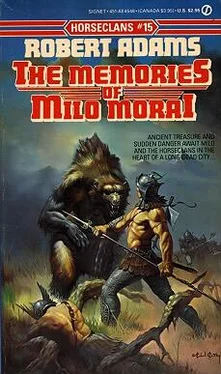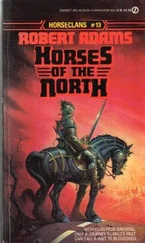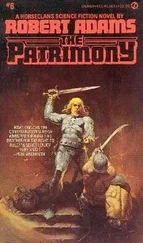“Now, Mr. Mehrdok, that I can feel a bit more trusting of you, just why were you and Mr. Rehnee seeking out this camp? Wait, don’t try to tell me aloud, open your mind to me, your memories of recent events. Here, I’ll show you how.”
Milo drew out a pipe and a bladder of tobacco while he sifted the contents of Mehrdok’s mind. While stuffing the pipe carefully, he said, nodding, “It’s the same old story, Wahrn. Your people aren’t anywhere nearly the first to experience it, you know.
“Long, long ago, while the technology needed to bring up water from very deep beneath the ground and bring in nutrients for the soil from hundreds and thousands of miles away in vast quantities still existed, the prairie and its peripheries were rich farming country; few lands in all this world were more productive of grain crops for both man and beast. But the so-called Great Dyings—a short, hideous spate of warfare followed by a few months of uncontrolled and uncontrollable plagues that almost wiped the races of mankind off the face of the earth—ended all of that. Some of the pitifully few survivors of those plagues continued farming marginal lands for a few years, even for a few generations . . . until the machines wore out and the last of the fertilizers were gone; then they all were faced with the same three bitter choices—seek out land easier to farm, become herding-hunting-gathering nomads, or stay and die. Frankly, I am astounded that you and yours have lasted as long as you have on that land, Wahrn. Not many have—generally, it’s either the second or the third generation that has to move on.
“We tried it, you know. The first two generations of the Horseclans were farmers, settled farmers ... for a while, if you can call moving on every ten or twelve years in search of better land a settled existence.
“The place where the first generation grew up and bred was good enough to begin, but then the weather changed to the point where it was just too dry, usually, for consistent yields, so we all moved on north, to the shores of a lake—a far bigger lake than this one, a mountain lake—but there, at that elevation, we found the winters to be so long and harsh that we moved on again. Much farther north, in what seemed at first to be a fine, rich-soiled river valley, we lived and farmed until the second generation were grown and breeding their own families.
“But, once again, the steadily increasing lengths of the winters, the deep, long-lasting snowfalls and the terrible ice-melt floods that heralded each spring all joined to make our position untenable. So, we packed up and moved on once again. That was a very long trek and we were forced to fight our way through parts of it, but we came finally to our destination, only to quickly realize that we could not stay long there, either, not if we expected to live and reproduce. We prepared for that move for years, and by the time we at last undertook the journey, the people were cleanly split into two factions—the larger were become sick of farming, they wanted to continue to move, to become herding, hunting, gathering nomads on the plains and prairie; the smaller faction wanted to continue to try farming, but in a better location than the one we just had left. That larger faction became the ancestors of the Horseclans of today. I’ve never been able to determine just what ever befell the smaller.”
Mehrdok looked puzzled, saying, “Milo, the Great Dyings, they took place close on to two hundred years ago . . . yet you speak as if you were there, from the very beginning of the clans.”
Milo stared into the farmer’s eyes over the bowl of the pipe. “I was, Wahrn. I’m well over two centuries old.”
“Impossible!” yelped Mehrdok. “Man, you’re a raving lunatic, must be. Look at you, yes, you’ve got a bit of silver hair, but you can’t be more than three, four, maybe five years older than me, if that! I’ve heard some tall tales in my time, but that one takes the cake. You don’t really expect me to believe such a yarn, do you?”
Milo just nodded, mindspeaking now. “Yes, it’s a hard thing to believe, Wahrn. Nonetheless, it’s true. There’s only one way to prove it to you, though. Here, enter into my memories as I entered into yours, earlier.”
Aloud, he said, “This may take some time. Herbuht, you and Gy entertain Mr. Rehnee for a while, eh?”
Slowly, inexorably, Clans Staiklee and Gahdfree marched northeastward, guided by young Djessee-Kahl Staiklee, following the same route that Milo’s party had earlier traveled. Of course, the clans could not hope to move as fast, cover as much distance in a day’s trek, as had Milo’s party, which had not been burdened with herds of cattle, sheep and goats. But the hunting had continued excellent, day after day, the only cattle butchered had been those few unadvoidably hurt too seriously to keep up with the herd, and Big Djahn Staiklee had consequently remained happy.
Sergeant Daiv Djahnstuhn, however, was far from happy. It now had been almost six days since hide or hair had been seen of the captain and the first sergeant of the Guardians, not even one of the horses had wandered back to its stableyard. Everyone was talking of it, of course, which meant that old Mosix had heard of the disappearances, too. Daiv expected any moment to be faced with an attempt of the onetime priest—who still had, for some reason, a little power among a few of the womenfolk—to blame the too-long absences upon the wrath of God and the Governor, then try to regain his former status. And Daiv—his wife being one of those who still reverenced Mosix—was not at all certain that he would be able to hold the Guardians steady enough to quell a religious mutiny, especially not with his goodwife, Rebah, as one of the mutineers. Sergeant Daiv Djahnstuhn longed and yearned for the sight of Captain Mehrdok, or even First Sergeant Rehnee, riding into the open space fronting the armory.
Despite his heavy load of doubts, however, Daiv did his assigned lieutenant’s duties to the best of his abilities. Turning the work of his farm over to his wife and children, he spent much of his time at the armory, trying to at least look busy, sending out the pot hunters each morning, helping to skin and butcher their kills each afternoon, then supervising the apportionment of game flesh to representatives of the families.
Each night, after suppertime, Guardians would ride or walk to the armory to inquire of word concerning Mehrdok and Rehnee, then to sit, sip homebrewed beer and speculate on just what might have happened to the captain and the first sergeant, whether or not a full-scale search should be mounted for the two, when it should be mounted, what direction should first be covered, how many men should go, who should command said search, since Daiv’s job was to stay and command the armory.
Daiv always listened to them, answered questions as best he could and drank down his fair share of the beer (which had all been seized—“commandeered,” Cap-tain Mehrdok had called it—from the cellars of the priests’ house and trundled back to the armory cellar on the same day that the library and conference table had been borne away), but at the same time he knew good and well that no search would ever actually take place, for something was always more important: crops to weed or muck or tend, livestock problems, petty disputes to be resolved, human and animal ill-nesses and minor injuries, always something. To get a search started, a real leader was needed, and Daiv Djahnstuhn knew in his heart of hearts that he was no such thing.
But he waited, listened, drank beer and tried to look as if he was doing his temporary job, to feel as if he was taking the place of the absent captain, always knowing that he was doing no such thing, feeling himself incapable of being a real leader, but afraid to show just how far he was beyond his depth.
Читать дальше












